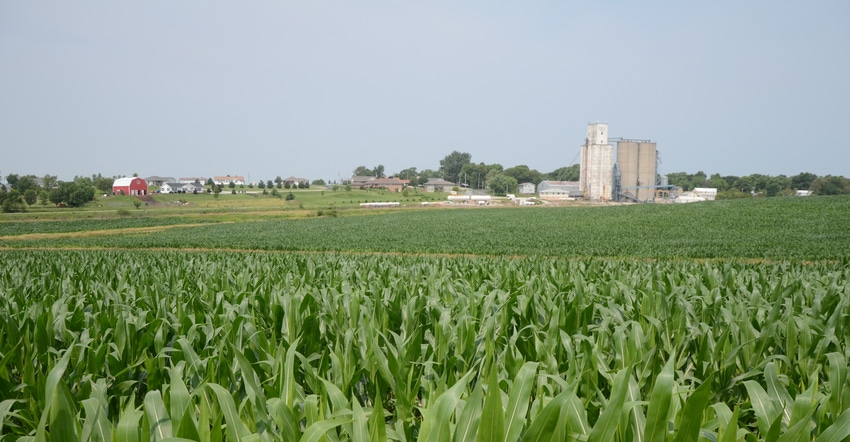
In September, the Platte Institute and the Nebraska Farm Bureau released a joint policy brief examining the economic disruptions from COVID-19 on Nebraska’s agriculture sector. The brief details the challenges the industry faced before and during the "one-two punch" brought on by the pandemic — as well as the ongoing uncertainties agriculture faces in its wake.
Jay Rempe, senior economist at the Nebraska Farm Bureau and co-author of the brief, pointed out that farmers and ranchers were dealing with their share of economic challenges even before COVID-19.
"We had seen over the last few years net income drop from over $7 billion for producers down to less than $3 billion," Rempe said. "That's almost a 70% drop over a three- or four-year period. Because of that, we'd seen bankruptcies creep up a little bit higher."
Related: Complete coronavirus coverage
The report shows that for the past 12 months ending June 30, Nebraska was second only to Wisconsin with the number of Chapter 12 bankruptcies filed at 38.
One-two punch
Then, when COVID-19 hit, it brought what Rempe describes as a "one-two punch."
"The first punch came in March with the shutdown with stay-at-home orders," Rempe said. "We saw a couple of things come out of that. One was a dramatic shift in food demand from the hotel and restaurant sector to the grocery retail sector. At the same time, we saw gasoline consumption plunge, which meant ethanol consumption dropped."
The second punch came in April and May, with health concerns and outbreaks at meat processing plants resulting in bottlenecks in the meat production sector. The brief shows that with shutdowns, reduced operations and slower speeds, meat processing facilities were operating between 60% to 70% of capacity at one point.
"We had animals that were ready to be slaughtered but weren't able to be slaughtered," Rempe said. "That was extra feed costs, and farmers had to figure out what to do with their animals for a period of time. We're still really working through that slog of animals that need to be processed."
Both of these punches resulted in additional declines in commodity prices, Rempe added. Earlier this year, the Nebraska Farm Bureau released an analysis showing if conditions did not improve, Nebraska's ag economy could lose nearly $3.7 billion in 2020.
This analysis accounted for production agriculture — as well as the ethanol sector — and adding specialty crop sectors and meat processing, this could mean more than $4 billion in losses.
"Fortunately, things have improved a little bit in the last couple of months," Rempe said. "We've seen some uptick, so maybe it won't be quite that bad. Also, the assistance will be very helpful."
Support helps keep ag afloat
Sarah Curry, Platte Institute policy director and one of the brief's authors, noted that the amount of relief the agriculture sector received in Nebraska highlights the impact COVID-19 had on the industry.
"One of the things that really struck us was the financial assistance that came from the federal government," she said. "It was very, very important. We saw that PPP loans, the Paycheck Protection Program, 19% of Nebraska's loans went specifically to agriculture. When we look at the total amount of loans, most of them went to the 3rd Congressional District, showing that rural Nebraska [and] agricultural areas were receiving a majority of that support."
"Also, almost 22,000 jobs were supported with the PPP loans, specifically in agriculture," Curry added. "When we look at that, corn farming, cattle farming and ranching, and feedlots received the most support for their jobs and their industry."
It's also worth noting, Curry said, that through the Coronavirus Aid, Relief, and Economic Security Act, agricultural enterprises also were eligible for the first time for Economic Injury Disaster Loans.
Curry noted both federal and state regulations were relaxed, to an extent, to aid the economic recovery of the agriculture sector. For example, USDA made adjustments to crop insurance, adjustments to restrictions on milk dumping, and flexibilities for commodity loans.
Meanwhile, the Nebraska Department of Agriculture allowed pesticide applicators to earn recertification through an online platform, and further eased restrictions for milk dumping at the state level.
Preparing for the future
Curry and Rempe added this also provides an opportunity to review certain weak links in the supply chain, as well as regulations in the event of a pandemic in the future.
According to the brief, food manufacturing is the fifth top-regulated industry in Nebraska, followed by animal production and crop production. Most of these regulations come from the Nebraska Department of Environmental Quality, now part of the Nebraska Department of Environment and Energy, as well as the Nebraska Department of Agriculture.
Curry noted the state's ethanol sector as an example. Nebraska is the second-largest ethanol producer in the nation.
"Nebraska has the capacity to produce 2.6 billion gallons of ethanol per year," Curry said. "But [due to federal regulations], we can only produce 2.1 billion gallons. So, there are half a billion gallons that are not being produced, and it's affecting our overall capacity. I think that's something that needs to be explored and looked into.
"We're lucky here in Nebraska because we've started a regulatory review process for occupational licensing, and I think we could do the same thing for regulations in general, because regulations for food and public safety are extremely important, and having a regulatory review process makes sure those regulations are up to date. Also, we can eliminate the unnecessary regulations that might be hinderances to our entrepreneurs and our livestock producers here in Nebraska."
Read more about:
Covid 19About the Author(s)
You May Also Like






